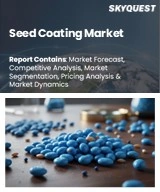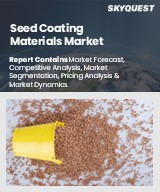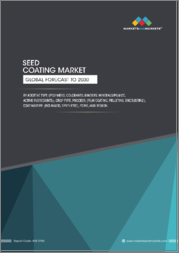
|
시장보고서
상품코드
1511326
종자 코팅 폴리머 시장 예측 : 폴리머 유형별, 작물 유형별, 프로세스별, 용도별, 지역별(-2030년)Seed Coating Polymers Market Forecasts to 2030 - Global Analysis By Polymer Type, Crop Type, Process, Application and By Geography |
||||||
Stratistics MRC에 따르면 세계 종자 코팅 폴리머 시장은 2024년에 20억 1,000만 달러를 차지하고 예측 기간 동안 CAGR은 10.5%로 성장했으며 2030년에는 40억 2,000만 달러에 이를 전망입니다.
종자 코팅 폴리머는 종자의 재료 취급, 보호 및 성능을 향상시키기 위해 종자에 적용되는 특수 재료입니다. 이러한 코팅에는 영양제, 살충제, 성장 촉진제 등이 포함되어 발아와 작물의 수율을 향상시킵니다. 필름 코팅, 패치, 펠렛화 등의 공정이 이들 폴리머를 도포하는데 사용되며, 종자의 균일성, 병원균으로부터의 보호, 이식을 용이하게 함으로써 보다 효율적이고 생산성이 높은 농법 를 지원합니다.
MDPI의 과학 잡지에 따르면, AgSAP(R)과 같은 농업에서 고흡수성 고분자의 사용은 관개 간격의 일수를 늘리고 살수를 50% 줄임으로써 절수에 도움이 됩니다.
고품질 씨앗에 대한 수요 증가
고품질 종자에 대한 요구 증가는 종자 코팅 폴리머 시장의 중요한 촉진요인입니다. 고품질 씨앗은 발아율 향상, 내병성 강화, 작물 수율 향상을 보장합니다. 종자 코팅 폴리머는 환경 스트레스 요인 및 해충으로부터 종자를 보호하는 보호 층을 제공함으로써 이러한 품질을 향상시킵니다. 이 수요의 배경은 농업 생산성을 극대화하고 증가하는 세계 인구의 식량 수요를 충족시킬 필요가 있습니다.
제한된 인식과 채용
특히 도상지역에서는 종자코팅 폴리머에 대한 인식과 채용이 한정적인 것이 시장 성장의 억제요인이 되고 있습니다. 많은 농부들은 종자의 성능 향상과 보호와 같은 종자 코팅 기술의 장점을 충분히 인식하지 못하고 있습니다. 게다가 소규모 농부들에게는 이러한 기술을 채택하기 위한 초기 비용이 엄청나게 될 수 있습니다. 이러한 인식 부족과 경제적 제약은 종자 코팅 폴리머의 보급을 제한하고 시장 확대를 억제하고 있습니다.
신흥 시장 확대
신흥 시장은 종자 코팅 폴리머 시장에 큰 비즈니스 기회입니다. 이 지역의 농업 관행이 현대화됨에 따라 작물의 수율과 회복력을 향상시키기 위한 고급 종자 기술에 대한 수요가 증가하고 있습니다. 기업은 이러한 지역의 농가 특유의 요구에 대응하는 비용 효율적인 맞춤형 씨앗 코팅 솔루션을 도입함으로써 이 기회를 활용할 수 있습니다. 신흥 시장에서의 확대는 종자 코팅 폴리머 시장의 상당한 성장을 가속할 수 있습니다.
병해충 저항성
병해충 저항성의 개척은 종자 코팅 폴리머 시장에 위협을 초래합니다. 시간이 지남에 따라 해충과 병원균은 종자 코팅에 사용되는 활성 성분에 대한 내성을 발달시켜 그 효과를 저하시킬 수 있습니다. 이러한 내성은 화학적 치료 증가로 이어져 환경과 건강에 영향을 미칠 수 있습니다. 이 위협에 대처하기 위해서는 진화하는 해충이나 병해의 과제를 선점하기 위한 끊임없는 기술 혁신과 새로운 제제의 개발이 필요합니다.
COVID-19의 영향:
COVID-19의 대유행은 세계 공급망을 혼란스럽게 하고, 원료의 이용가능성에 영향을 주었고, 종자 코팅제의 제조 공정을 지연시켰습니다. 이는 공급 부족과 생산 지연으로 이어져 시장 성장에 영향을 주었습니다. 그러나 팬데믹은 식량 안보의 중요성을 부각시키고 정부가 농업 지원과 농업 투자 증가를 촉구했습니다.
예측 기간 동안 합성 폴리머 부문이 최대가 될 것으로 예상
합성 고분자 부문은 씨앗의 발아와 보호를 강화하는 우수한 성능으로 시장을 독점할 것으로 예상됩니다. 합성 폴리머는 환경 스트레스 요인, 병해충에 대한 견고한 보호 장벽을 제공하여 종자의 생존율과 작물 수율의 향상을 보장합니다. 비용효과가 높고, 도포가 용이하기 때문에 농가에게 선호되고, 널리 채용되어, 시장 성장에 크게 기여하고 있습니다.
과일·야채 부문은 예측 기간 중 가장 높은 CAGR이 예상된다.
과일 및 채소 부문은 고가치 작물에 대한 수요가 증가함에 따라 CAGR이 가장 높을 것으로 예측됩니다. 과일 및 채소용 씨앗 코팅은 씨앗의 성능을 향상시키고, 발아율을 향상시키고, 병해충으로부터 보호를 제공합니다. 신선한 농산물에 대한 소비자의 선호도 증가와 원예 활동의 확대는 이 분야의 고급 종자 코팅 솔루션 수요를 촉진하고 급성장에 기여하고 있습니다.
최대 점유율을 차지하는 지역
북미는 첨단 농업 관행과 혁신 기술의 채택률이 높기 때문에 종자 코팅 폴리머 시장을 독점하는 입장에 있습니다. 이 지역에서는 작물의 수율과 종자의 성능을 높이는 데 중점을두고 있으며, 종자 코팅 폴리머 수요를 견인하고 있습니다. 또한 주요 시장 선수의 존재와 R&D에 대한 많은 투자가 북미 시장에서 주도적 지위를 더욱 강화하고 있습니다.
CAGR이 가장 높은 지역:
아시아태평양은 농업 활동 증가와 농법의 현대화로 종자 코팅 폴리머 시장의 급성장이 예상됩니다. 중국과 인도와 같은 국가들은 작물 생산성을 향상시키고 대규모 인구의 식량 수요를 충족시키기 위해 첨단 농업 기술에 많은 투자를 하고 있습니다. 씨앗 코팅의 장점에 대한 인식 증가와 농업 개발을 지원하는 정부의 이니셔티브는이 지역의 CAGR 높이에 기여합니다.
무료 사용자 정의 서비스:
이 보고서를 구독하는 고객은 다음 무료 맞춤설정 옵션 중 하나를 사용할 수 있습니다.
- 기업 프로파일
- 추가 시장 기업의 종합적 프로파일링(3개사까지)
- 주요 기업의 SWOT 분석(3개사까지)
- 지역 세분화
- 고객의 관심에 응한 주요국 시장 추계·예측·CAGR(주: 타당성 확인에 따름)
- 경쟁 벤치마킹
- 제품 포트폴리오, 지리적 존재, 전략적 제휴에 기반한 주요 기업 벤치마킹
목차
제1장 주요 요약
제2장 서문
- 개요
- 이해관계자
- 조사 범위
- 조사 방법
- 데이터 마이닝
- 데이터 분석
- 데이터 검증
- 조사 접근
- 조사 정보원
- 1차 조사 정보원
- 2차 조사 정보원
- 전제조건
제3장 시장 동향 분석
- 성장 촉진요인
- 억제요인
- 기회
- 위협
- 용도 분석
- 신흥 시장
- COVID-19의 영향
제4장 Porter's Five Forces 분석
- 공급기업의 협상력
- 구매자의 협상력
- 대체품의 위협
- 신규 진입업자의 위협
- 경쟁 기업간 경쟁 관계
제5장 세계의 종자 코팅 폴리머 시장 : 폴리머 유형별
- 천연 폴리머
- 합성 폴리머
- 생분해성 폴리머
제6장 세계의 종자 코팅 폴리머 시장 :작물 유형별
- 시리얼·곡물
- 밀
- 옥수수
- 보리
- 기타
- 지방종자 및 콩류
- 콩
- 카놀라
- 해바라기
- 땅콩
- 렌틸콩
- 기타
- 과일·야채
- 토마토
- 인삼
- 딸기
- 양상추
- 사과
- 포도
- 기타
- 꽃 및 관상 식물
- 장미
- 페튜니아
- 튤립
- 기타
- 기타 작물
제7장 세계의 종자 코팅 폴리머 시장 : 프로세스별
- 필름 코팅
- 인클래스팅
- 펠렛화
제8장 세계의 종자 코팅 폴리머 시장 : 용도별
- 씨앗 강화
- 수분 관리
- 해충·병 대책
제9장 세계의 종자 코팅 폴리머 시장 :지역별
- 북미
- 미국
- 캐나다
- 멕시코
- 유럽
- 독일
- 영국
- 이탈리아
- 프랑스
- 스페인
- 기타 유럽
- 아시아태평양
- 일본
- 중국
- 인도
- 호주
- 뉴질랜드
- 한국
- 기타 아시아태평양
- 남미
- 아르헨티나
- 브라질
- 칠레
- 기타 남미
- 중동 및 아프리카
- 사우디아라비아
- 아랍에미리트(UAE)
- 카타르
- 남아프리카
- 기타 중동 및 아프리카
제10장 주요 발전
- 계약/파트너십/협업/합작투자(JV)
- 인수와 합병
- 신제품 발매
- 사업 확대
- 기타 주요 전략
제11장 기업 프로파일링
- BASF SE
- Bayer AG
- Clariant AG
- Croda International Plc
- BrettYoung
- Germains Seed Technology
- Michelman Inc.
- Precision Laboratories
- Incotec Group BV
- Sensient Technologies Corporation
- Sumitomo Chemical Co., Ltd.
- Syngenta AG
- Cargill, Incorporated
- Chemtura Corporation
- Milliken & Company
- Plant Health Care
- Mahendra Overseas
- SATEC Srl
- Lanxess AG
According to Stratistics MRC, the Global Seed Coating Polymers Market is accounted for $2.01 billion in 2024 and is expected to reach $4.02 billion by 2030 growing at a CAGR of 10.5% during the forecast period. Seed coating polymers are specialized materials applied to seeds to improve their handling, protection, and performance. These coatings can include nutrients, pesticides, and growth enhancers, facilitating better germination and crop yields. Processes like film coating, encrusting, and pelleting are used to apply these polymers, enhancing seed uniformity, protection against pathogens, and ease of planting, thus supporting more efficient and productive agricultural practices.
According to a scientific journal in MDPI, the use of superabsorbent polymers in agriculture, such as AgSAP(R), helps in water conservation by increasing the number of days between irrigation and reducing watering by 50%.
Market Dynamics:
Driver:
Increasing demand for high-quality seeds
The growing need for high-quality seeds is a significant driver in the seed coating polymers market. High-quality seeds ensure better germination rates, enhanced disease resistance, and improved crop yields. Seed coating polymers enhance these qualities by providing a protective layer that shields seeds from environmental stressors and pests. This demand is driven by the need to maximize agricultural productivity and meet the food requirements of a growing global population.
Restraint:
Limited awareness and adoption
Limited awareness and adoption of seed coating polymers, particularly in developing regions, act as a restraint on market growth. Many farmers are not fully aware of the benefits of seed coating technologies, such as improved seed performance and protection. Additionally, the initial cost of adopting these technologies can be prohibitive for small-scale farmers. This lack of awareness and financial constraint limits the widespread adoption of seed coating polymers, thereby restraining market expansion.
Opportunity:
Expansion in emerging markets
Emerging markets present a significant opportunity for the seed coating polymers market. As agricultural practices in these regions modernize, there is an increasing demand for advanced seed technologies to improve crop yields and resilience. Companies can capitalize on this opportunity by introducing cost-effective and tailored seed coating solutions that cater to the specific needs of farmers in these regions. Expansion in emerging markets can drive substantial growth in the seed coating polymers market.
Threat:
Pest and disease resistance
The development of pest and disease resistance poses a threat to the seed coating polymers market. Over time, pests and pathogens can develop resistance to the active ingredients used in seed coatings, reducing their effectiveness. This resistance can lead to increased use of chemical treatments, which may have environmental and health implications. Addressing this threat requires continuous innovation and development of new formulations to stay ahead of evolving pest and disease challenges.
Covid-19 Impact:
The Covid-19 pandemic disrupted global supply chains, affecting the availability of raw materials and delaying manufacturing processes for seed coatings. This led to supply shortages and production delays, impacting market growth. However, the pandemic also highlighted the importance of food security, driving increased government support and investment in agriculture, which is expected to stimulate demand for seed coatings post-pandemic.
The synthetic polymers segment is expected to be the largest during the forecast period
The synthetic polymers segment is expected to dominate the market due to its superior performance in enhancing seed germination and protection. Synthetic polymers provide a robust protective barrier against environmental stressors, pests, and diseases, ensuring higher seed viability and crop yields. Their cost-effectiveness and ease of application make them a preferred choice among farmers, driving their widespread adoption and contributing significantly to market growth.
The fruits & vegetables segment is expected to have the highest CAGR during the forecast period
The fruits and vegetables segment is projected to have the highest CAGR due to the increasing demand for high-value crops. Seed coatings for fruits and vegetables enhance seed performance, improve germination rates, and provide protection against pests and diseases. The growing consumer preference for fresh produce and the expansion of horticultural activities drive the demand for advanced seed coating solutions in this segment, contributing to its rapid growth.
Region with largest share:
North America is positioned to dominate the seed coating polymers market due to its advanced agricultural practices and high adoption of innovative technologies. The region's strong focus on enhancing crop yields and seed performance drives the demand for seed coating polymers. Additionally, the presence of major market players and substantial investments in research and development further bolster North America's leading position in the market.
Region with highest CAGR:
The Asia Pacific region anticipates rapid growth in the seed coating polymers market due to increasing agricultural activities and modernization of farming practices. Countries like China and India are investing heavily in advanced agricultural technologies to improve crop productivity and meet the food demands of their large populations. The growing awareness of the benefits of seed coatings and government initiatives to support agricultural development contribute to the high CAGR in this region.
Key players in the market
Some of the key players in Seed Coating Polymers Market include BASF SE, Bayer AG, Clariant AG, Croda International Plc, BrettYoung, Germains Seed Technology, Michelman Inc., Precision Laboratories, Incotec Group BV, Sensient Technologies Corporation, Sumitomo Chemical Co., Ltd., Syngenta AG, Cargill, Incorporated, Chemtura Corporation, Milliken & Company, Plant Health Care, Mahendra Overseas, SATEC Srl and Lanxess AG.
Key Developments:
In November 2023, BASF Agricultural Solutions is introducing the next level of seed coating with Flo Rite Pro 02 plantability polymer. Flo Rite Pro 02 uses advanced polymer-based technology to combine adhesion properties with exceptional seed flow helping to provide maximum yield potential. Seed singulation and uniform spacing are critical to yield, and with the size of planters, seeds are required to travel long distances at high speeds to achieve uniform spacing. Flo Rite Pro 02 has been developed by BASF specifically to maximize seed flow, optimizing singulation, seed spacing and plant population to help increase yield potential.
In June 2023, Precision Laboratories, LLC, a provider of specialized chemistries for the agricultural industry, and Direct Enterprises, Inc. (DEI), a distributor focused on value-added products for seed producers and conditioners, have entered into a distribution agreement that expands market access for seed-applied technologies. Under the supply and distribution agreement DEI will be the exclusive distributor of Precision Laboratories' proprietary seed enhancement and seed treatment line of products in states east of the Rocky Mountains.
Polymer Types Covered:
- Natural Polymers
- Synthetic Polymers
- Biodegradable Polymers
Crop Types Covered:
- Cereals & Grains
- Oilseeds & Pulses
- Fruits & Vegetables
- Flowers & Ornamentals
- Other Crop Types
Process Covered:
- Film Coating
- Encrusting
- Pelleting
Applications Covered:
- Seed Enhancement
- Moisture Management
- Pest & Disease Control
Regions Covered:
- North America
- US
- Canada
- Mexico
- Europe
- Germany
- UK
- Italy
- France
- Spain
- Rest of Europe
- Asia Pacific
- Japan
- China
- India
- Australia
- New Zealand
- South Korea
- Rest of Asia Pacific
- South America
- Argentina
- Brazil
- Chile
- Rest of South America
- Middle East & Africa
- Saudi Arabia
- UAE
- Qatar
- South Africa
- Rest of Middle East & Africa
What our report offers:
- Market share assessments for the regional and country-level segments
- Strategic recommendations for the new entrants
- Covers Market data for the years 2022, 2023, 2024, 2026, and 2030
- Market Trends (Drivers, Constraints, Opportunities, Threats, Challenges, Investment Opportunities, and recommendations)
- Strategic recommendations in key business segments based on the market estimations
- Competitive landscaping mapping the key common trends
- Company profiling with detailed strategies, financials, and recent developments
- Supply chain trends mapping the latest technological advancements
Free Customization Offerings:
All the customers of this report will be entitled to receive one of the following free customization options:
- Company Profiling
- Comprehensive profiling of additional market players (up to 3)
- SWOT Analysis of key players (up to 3)
- Regional Segmentation
- Market estimations, Forecasts and CAGR of any prominent country as per the client's interest (Note: Depends on feasibility check)
- Competitive Benchmarking
- Benchmarking of key players based on product portfolio, geographical presence, and strategic alliances
Table of Contents
1 Executive Summary
2 Preface
- 2.1 Abstract
- 2.2 Stake Holders
- 2.3 Research Scope
- 2.4 Research Methodology
- 2.4.1 Data Mining
- 2.4.2 Data Analysis
- 2.4.3 Data Validation
- 2.4.4 Research Approach
- 2.5 Research Sources
- 2.5.1 Primary Research Sources
- 2.5.2 Secondary Research Sources
- 2.5.3 Assumptions
3 Market Trend Analysis
- 3.1 Introduction
- 3.2 Drivers
- 3.3 Restraints
- 3.4 Opportunities
- 3.5 Threats
- 3.6 Application Analysis
- 3.7 Emerging Markets
- 3.8 Impact of Covid-19
4 Porters Five Force Analysis
- 4.1 Bargaining power of suppliers
- 4.2 Bargaining power of buyers
- 4.3 Threat of substitutes
- 4.4 Threat of new entrants
- 4.5 Competitive rivalry
5 Global Seed Coating Polymers Market, By Polymer Type
- 5.1 Introduction
- 5.2 Natural Polymers
- 5.3 Synthetic Polymers
- 5.4 Biodegradable Polymers
6 Global Seed Coating Polymers Market, By Crop Type
- 6.1 Introduction
- 6.2 Cereals & Grains
- 6.2.1 Wheat
- 6.2.2 Corn
- 6.2.3 Barley
- 6.2.4 Other Cereals & Grains
- 6.3 Oilseeds & Pulses
- 6.3.1 Soybean
- 6.3.2 Canola
- 6.3.3 Sunflower
- 6.3.4 Peanuts
- 6.3.5 Lentils
- 6.3.6 Other Oilseeds & Pulses
- 6.4 Fruits & Vegetables
- 6.4.1 Tomato
- 6.4.2 Carrot
- 6.4.3 Strawberries
- 6.4.4 Lettuce
- 6.4.5 Apples
- 6.4.6 Grapes
- 6.4.7 Other Fruits & Vegetables
- 6.5 Flowers & Ornamentals
- 6.5.1 Roses
- 6.5.2 Petunias
- 6.5.3 Tulips
- 6.5.4 Other Flowers & Ornamentals
- 6.6 Other Crop Types
7 Global Seed Coating Polymers Market, By Process
- 7.1 Introduction
- 7.2 Film Coating
- 7.3 Encrusting
- 7.4 Pelleting
8 Global Seed Coating Polymers Market, By Application
- 8.1 Introduction
- 8.2 Seed Enhancement
- 8.3 Moisture Management
- 8.4 Pest & Disease Control
9 Global Seed Coating Polymers Market, By Geography
- 9.1 Introduction
- 9.2 North America
- 9.2.1 US
- 9.2.2 Canada
- 9.2.3 Mexico
- 9.3 Europe
- 9.3.1 Germany
- 9.3.2 UK
- 9.3.3 Italy
- 9.3.4 France
- 9.3.5 Spain
- 9.3.6 Rest of Europe
- 9.4 Asia Pacific
- 9.4.1 Japan
- 9.4.2 China
- 9.4.3 India
- 9.4.4 Australia
- 9.4.5 New Zealand
- 9.4.6 South Korea
- 9.4.7 Rest of Asia Pacific
- 9.5 South America
- 9.5.1 Argentina
- 9.5.2 Brazil
- 9.5.3 Chile
- 9.5.4 Rest of South America
- 9.6 Middle East & Africa
- 9.6.1 Saudi Arabia
- 9.6.2 UAE
- 9.6.3 Qatar
- 9.6.4 South Africa
- 9.6.5 Rest of Middle East & Africa
10 Key Developments
- 10.1 Agreements, Partnerships, Collaborations and Joint Ventures
- 10.2 Acquisitions & Mergers
- 10.3 New Product Launch
- 10.4 Expansions
- 10.5 Other Key Strategies
11 Company Profiling
- 11.1 BASF SE
- 11.2 Bayer AG
- 11.3 Clariant AG
- 11.4 Croda International Plc
- 11.5 BrettYoung
- 11.6 Germains Seed Technology
- 11.7 Michelman Inc.
- 11.8 Precision Laboratories
- 11.9 Incotec Group BV
- 11.10 Sensient Technologies Corporation
- 11.11 Sumitomo Chemical Co., Ltd.
- 11.12 Syngenta AG
- 11.13 Cargill, Incorporated
- 11.14 Chemtura Corporation
- 11.15 Milliken & Company
- 11.16 Plant Health Care
- 11.17 Mahendra Overseas
- 11.18 SATEC Srl
- 11.19 Lanxess AG

















